Over 90% of Fortune 500 companies have mentorship programs. But here’s the thing: they don’t all look the same. In fact, there’s no one-size-fits-all solution to mentoring, which is why you’ll often see different types of mentoring across organizations.
Curious about the different types of mentoring? Wondering if one is better than the others? Not sure which one makes the most sense for your team?
In this article, we’ll explore different types of mentoring in the workplace and how you can leverage them to build an impactful mentorship program for your business.
Why is mentoring important in the workplace?
Mentoring creates opportunities for individuals to gain knowledge and advice from more experienced peers and counterparts. In the workplace, mentoring can help employees gain the skills and confidence they need to advance their careers, build networks, feel connected, and create professional growth.
Mentoring also extends beyond individual employees and their personal career goals. Corporate mentorship programs can help businesses build stronger teams and reach organizational objectives.
Here are some specific benefits of mentoring in the workplace:
- Mentoring fosters employee skills development: Organizations that choose to upskill instead of hiring externally save anywhere from 70-92%. Mentorship helps employees unlock the skills and opportunities they need to reach the next stage of their careers.
- Mentoring improves employee happiness and engagement: 9 in 10 employees who have a mentor at work are happy in their jobs, resulting in a more productive and engaged workforce
- Mentoring improves workplace diversity, equity, and inclusion: Diversity mentorship programs help advance employees from underrepresented backgrounds while creating the connections they need to feel like they belong. Representation of equity-seeking groups at management level increases by up to 24% with a mentoring program.
- Mentoring drives higher rates of employee retention: Employees value growth and learning opportunities and mentorship is an important piece of the puzzle. A 10KC study found that 60% of all respondents would consider leaving their current company to join one with more opportunities for mentorship.
- Mentoring builds stronger internal talent pipelines: Mentoring can provide mentees with the support and resources needed to take on future roles within the organization. Mentors can help employees identify skills development opportunities and provide support, so they’re willing and ready to step into an open role when the time comes.
Types of mentoring relationships
Mentoring relationships can come to fruition in many different ways. However, they typically fall into one-of-two categories: informal mentoring and formal mentoring.
Informal mentoring
A study found that 61% of mentor-mentee relationships developed naturally. When mentorship relationships are built without any sort of formal matchmaking, they fall into the category of informal mentoring. The informal mentoring process tends to go with the flow and relies entirely on the mentor and mentee to succeed.
For example, let’s say a junior employee happens to strike up a conversation with a senior manager in the lunchroom one day. Over time, they build a relationship where the junior employee comes to the senior manager for career advice.. This would be a type of informal mentoring.
Whether you’re aware of it or not, informal mentoring is likely already taking place within your organization. But…there are many challenges with informal mentoring. It often relies on chance, biases, or an employee’s personal connections. This can put employees who might be less visible (like remote team members) or those from underrepresented backgrounds at a disadvantage. In many instances, the lack of structure can also dampen the effectiveness of the mentorship relationship.
Formal mentoring
Formal mentoring is when mentor-mentee relationships are established through a structured mentorship program within an organization. These programs put organizational objectives at the center—whether it’s driving employee engagement, improving retention, or supporting employee development.
“Formal mentoring programs provide talent – especially diverse talent – with the skills and relationships needed to advance in their careers and create a sense of belonging to their organizations.” Dave Wilkin, 10KC CEO
With formal mentorship, the organization takes the lead when it comes to creating formal mentor-mentee matches. This helps create meaningful matches and ensures equitable opportunity. More robust formal mentorship programs also establish meeting cadences, guided curriculums, and success metrics to make sure everyone stays on track.
The structured approach helps everyone make the most of their mentorship experience. A Gallup survey found that employees with formal mentors or sponsors are 38% more likely than those with informal mentors or sponsors to strongly agree that they have someone at work who helps them reach their career goals.
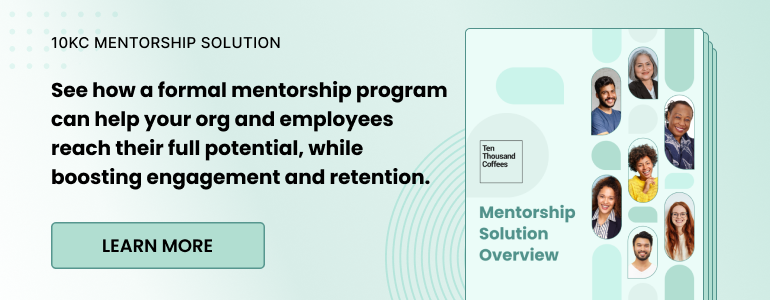
Types of mentoring in the workplace
Formal mentorship programs are the best way to make sure your organization’s mentoring efforts are inclusive, equitable, and successful. But formal programs aren’t one-size-fits-all, and depending on your team and goals, there are many different ways you can approach a corporate mentorship program.
Let’s look at 10 different types of mentoring in the workplace.
1. One-on-one mentoring
One-on-one mentoring is easily the most common and traditional form of mentoring. It’s what we typically imagine when we think of mentorship.
In one-on-one mentoring, an early to mid-career employee—the mentee—is provided with valuable guidance and support in their career journey from a more experienced mentor. The relationship exists exclusively between two individuals.
One-on-one mentoring is a popular choice for formal mentoring programs for several reasons:
- Individualized support and guidance ensures that the mentee gets the professional support they need.
- One-on-one relationships create a safe space for mentees to be vulnerable and openly share their concerns and challenges.
- A personal connection allows mentors and mentees to build trust and a strong relationship.
One-on-one mentorship is incredibly impactful, which is why it’s so popular. But it can be a large commitment for both mentor and mentee—which is where alternatives to one-on-one mentoring come in.
2. Group mentoring
Group mentoring refers to mentorship relationships where one individual takes on the role of mentor to multiple mentees at the same time.
Group mentoring makes it possible for busy leaders to act as mentors and support multiple individuals without becoming overwhelmed with the responsibilities of being a mentor. It’s also an effective option when there are fewer mentors available within an organization.
The benefits of group mentoring also go beyond the mentor-mentee relationship. This community-driven approach allows mentees to collaborate with their peers and other mentees—almost similar to a peer mentoring experience. (Which we cover later in this article.)
Although less common, group mentoring is sometimes also used to describe situations where mentees have multiple mentors.
3. Virtual mentoring
As the name suggests, virtual mentoring takes place 100% online.
Virtual mentoring has become more popular with the rise of remote and hybrid work. And as we’ve learned over the last few years, relationships—while sometimes tricky—can absolutely be built in a virtual setting.
The flexibility of virtual mentoring makes it an effective solution for creating more mentorship opportunities and expanding employee networks. By turning to virtual mentoring, organizations can connect individuals with mentors outside of their geographic region, opening the door to a larger pool of mentors and the potential for more impactful mentorship matches.
For example, virtual mentoring makes it possible to connect a mid-level manager at a satellite office to an executive at a head office through virtual meetings. When limited to in-person mentors, employees may only have access to leaders and seniority levels at their local office.
In remote-first or hybrid companies, virtual mentoring can be a valuable tool in fostering belonging and connection. But even if your team has returned to the office and geography isn’t prohibitive, the flexibility of virtual mentoring can still be beneficial in increasing employee program participation and engagement.
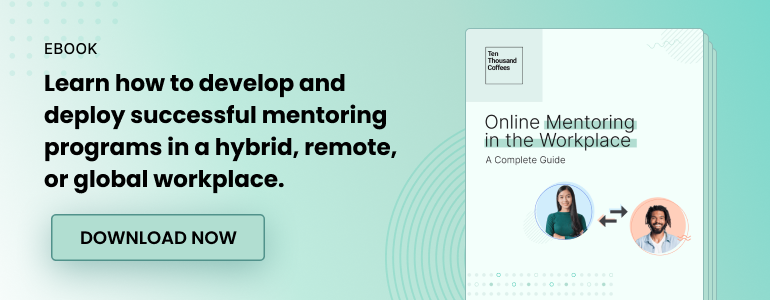
4. Reverse mentoring
It’s a common misconception that only senior leaders are able to take on the role of mentor. The world of work is constantly changing, and reverse mentoring allows more junior individuals to share their knowledge with those who would be traditionally viewed as more experienced.
For example, consider a junior social media marketer, or a recent graduate that studied UX design. These employees could act as a mentor to a senior executive on social media use or web design. This would be a form of reverse mentoring.
Not only does reverse mentoring help senior employees unlock new skills and perspectives, but reverse mentoring can build purpose and belonging by allowing junior and mid-level employees to make an impact on senior leaders.
While reverse mentoring is a distinct type of mentoring, no mentor-mentee relationship should be one-sided. A common mentoring mistake is when senior mentors miss the opportunity to learn from and collaborate with their mentees. Even a traditional mentoring relationship should always be viewed as a two-way street.
5. Flash mentoring
Flash mentoring gives individuals an opportunity to connect with mentors for a short period of time. In many instances, flash mentoring is a one-time meeting. However, traditional mentoring relationships typically can be more effective than flash mentoring, since the mentor and mentee build a stronger relationship over time.
A common example of flash mentoring includes speed sessions at conferences or events. Think of it like speed dating, but instead of a potential partner, individuals get the opportunity to connect with mentors and gain guidance over a limited period of time.
If there are time and resource constraints, flash mentoring can be helpful, and these brief connections can turn into longer-term mentoring relationships.
6. Executive mentoring
We often turn to leaders and executives to step into the role of mentor. But leaders and executives need mentors too. The reality is that executives stepping into senior leadership roles for the first time or navigating changing professional and business landscapes can struggle to find trusted individuals to lean on for support.
Executive mentoring intentionally connects C-suite executives and senior leaders with advisors or other peers who can provide the advice they need to grow professionally as a leader.
While we often assume executives have all the answers, even the best organizational leaders can benefit from mentoring to improve their skills as leaders and key decision-makers within an organization.
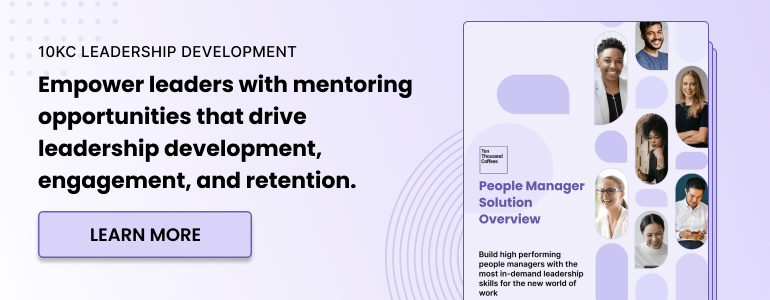
7. Situational mentoring
Somewhat similar to flash mentoring, situational mentoring is typically a short-term relationship. But rather than being time-bound, it’s limited to a specific situation.
Situational mentoring is very goal-oriented and the relationship comes to a natural end once that goal has been reached. By connecting employees with subject matter experts, situational mentoring gives employees the support they need to learn a new skill or solve a problem that they’re currently facing.
For example, an employee who is paired with a mentor as they prepare to step into a new role is a form of situational mentoring. Situational mentoring relationships may also be formed around a specific project or business objective.
8. Cross-functional mentoring
Modern career’s no longer follow the clear-cut linear paths of years past. This means, for employees to make the most of their career experience, organizations need to provide them with the opportunity to connect with leaders or peers outside of their direct team or function.
Cross-functional mentoring also helps boost opportunities for career mobility within the organization and enables employees to become better at their jobs by understanding functions beyond their own.
Consider a marketing manager—a mentee—who is paired with a product mentor. This cross-functional mentoring relationship can help the mentee gain insight into the product function. Over time, this knowledge sharing can help the mentee become a more effective marketer. It might even open the door for them to transition into a product or product-marketing role in the future.
By connecting individuals across functions through cross-functional mentoring, you can also improve collaboration and connection across teams that may otherwise rarely work together.
9. Training-based mentoring
Employees often go through training at different points of their careers, whether it’s new-hire onboarding or training for a new skill or role. Training-based mentoring pairs trainees with mentors who can help guide them through the training process.
Training can often come with overwhelming amounts of new information. Having a mentor to show mentees the ropes and share tips and tricks can elevate the training experience and help employees progress at a faster pace.
10. Peer mentoring
Unlike the traditional junior-senior mentorship partnership, peer mentoring pairs individuals of similar roles and stages in their careers. This type of mentoring takes a collaborative approach to employee learning and development.
For example, two people managers with similar team structures and career aspirations might be paired together to share their experiences and insights on managing their teams.
By building these kinds of relationships with their peers, employees are exposed to a wider range of diverse perspectives. This encourages employees to consider new ideas and different approaches in their work.
Over time, peer mentoring can also foster a stronger sense of belonging and community among teams.
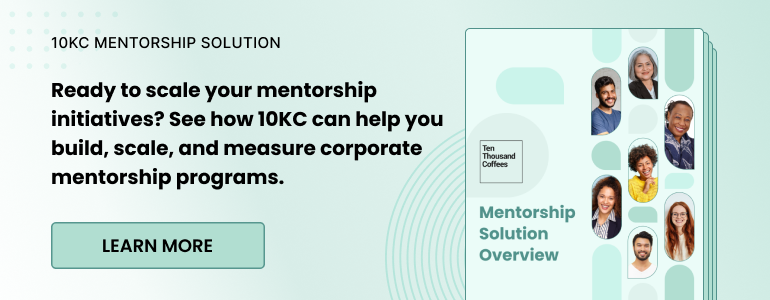
Using 10KC to facilitate more impactful mentoring programs
No mentoring program can—or should—look alike. No matter what type of mentoring program you need, 10KC can help you build, manage, and scale corporate mentorship programs to reach your goals.
10KC’s fully-integrated platform empowers organizations to:
- Make smarter matches: 10KC’s Smart Match algorithm creates unbiased matches at scale, pairing mentors and mentees based on shared interests and career goals—all at the click of a button.
- Build curriculums that make an impact: From off-the-shelf programs to tailored solutions, 10KC’s Development Programs keep participants engaged and help you meet your business needs.
- Stay on top of mentorship success: Reach your business goals and keep a pulse on activity with Data Dashboards and insights.
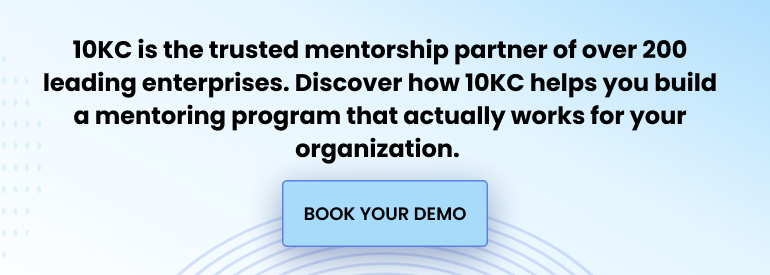
Types of mentoring FAQS
What are the most common mentoring models?
The most common mentoring models include:
- One-on-one mentoring: The most traditional form of mentoring, pairing a mentee with one mentor.
- Group mentoring: A model where one person serves as mentor for multiple mentees at once.
- Virtual mentoring: This form of mentoring takes place mostly or exclusively online.
- Reverse mentoring: Unlike a traditional mentoring relationship, a more junior peer takes on the role of mentor.
- Flash mentoring: This is a short-term mentoring model, such as a one-time meeting.
- Executive mentoring: A type of mentoring that prioritizes leaders stepping into executive roles.
- Situational mentoring: A model where the mentor relationship is designed for a specific situation or project.
- Cross-functional mentoring: A type of mentoring that connects peers in different departments or job functions.
- Training-based mentoring: A relationship designed to help a mentee navigate a training program.
- Peer mentoring: This form of mentoring connects peers in similar levels or career stages.









.png)